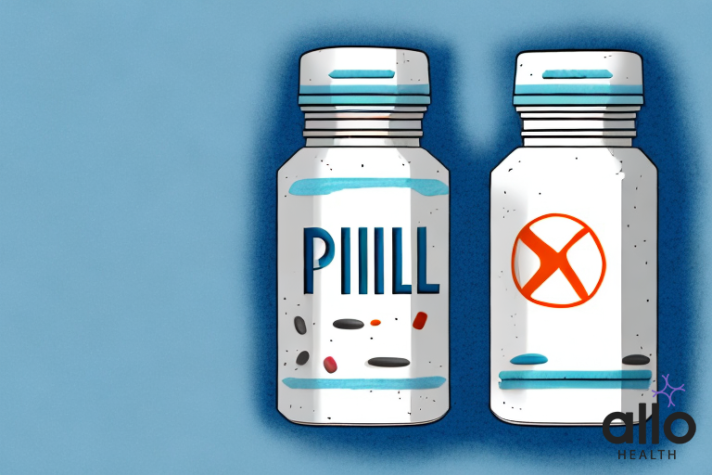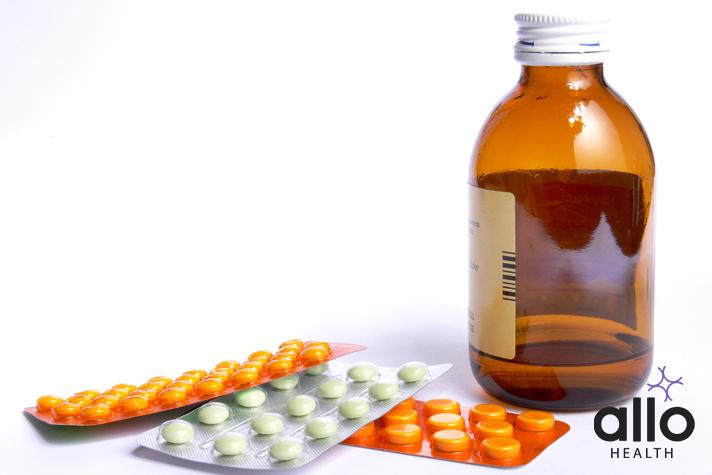Exploring the Impact of Antihistamines on Erectile Dysfunction

Allo Health is dedicated to personalized well-being, offering support and trusted information tailored to individual health goals. The platform emphasizes human-generated content, led by a distinguished medical team of experts, including physicians and sexual health specialists. Their commitment to credibility involves rigorous fact-checking, authoritative research, and continuous updates to ensure accurate, up-to-date information. Allo Health's unique approach goes beyond conventional platforms, providing expert-led insights and a continuous commitment to excellence, with user feedback playing a crucial role in shaping the platform's authoritative voice.

Dr.Sushma.V completed MBBS degree from BGS GIMS,bangalore
Why This Was Upated?
Our experts continually monitor the health and wellness space, and we update our articles when new information became available.
Updated on 24 January, 2024
- Article was updated as part of our commitment to diversity, equity, and inclusion.

"The following blog article may discuss medical treatments and interventions. However, it is important to note that the information provided is for general educational purposes only and should not be considered as a substitute for professional medical advice, diagnosis, or treatment. Always seek the guidance of a qualified healthcare professional for personalized medical advice.
Book consultation
Medical treatments are complex and should be tailored to individual circumstances. The information presented in this blog may not be applicable to everyone, as each person's medical condition, history, and needs are unique. Only a qualified healthcare professional can evaluate your specific medical situation, consider relevant factors, and provide appropriate recommendations for diagnosis, treatment options, and monitoring.
It is crucial to note that self-diagnosis, self-medication, or relying solely on the information provided in this blog for treatment decisions can have serious health consequences. "
Antihistamines are commonly used over-the-counter and prescription medications to alleviate allergic reactions symptoms, heartburn and motion sickness. Recent findings have highlighted a previously overlooked aspect of these medications: their potential impact on sexual function, particularly in men. Histamine, a chemical involved in allergic response, also plays a role in sexual arousal and erections. Some antihistamines, such as Tagamet (cimetidine), Benadryl (diphenhydramine), Dramamine (dimenhydrinate) and others, have been associated with erectile dysfunction (ED). This article explores the connection between antihistamines and sexual function and discusses potential solutions for individuals facing this issue.
The Role of Histamine in Sexual Function
Histamine is known to act as a neurotransmitter and is thought to contribute to sexual arousal and the ability to achieve and maintain erections. In the body, histamine’s action is blocked by antihistamines, which are widely used to alleviate various medical conditions. This blockage of histamine’s effects can lead to unintended consequences, including sexual dysfunction.
The Link Between Antihistamines and Erectile Dysfunction
Certainly, let’s delve deeper into the specific antihistamines that have been linked to erectile dysfunction, emphasizing their impact and the concerns they raise for individuals who rely on these medications:
1. Diphenhydramine (Benadryl):
- Diphenhydramine, commonly found in Benadryl and other allergy medications, is known for its sedative effects.
- It is classified as a first-generation antihistamine, which tends to have a higher likelihood of causing drowsiness and affecting sexual function.
- While it effectively treats allergy symptoms, it can lead to erectile dysfunction as a sexual side effect, potentially causing distress for users.
2. Dimenhydrinate (Dramamine):
- Dimenhydrinate, often used to alleviate motion sickness and nausea, shares characteristics with diphenhydramine.
- Like diphenhydramine, it is a first-generation antihistamine with sedative properties, which can contribute to sexual dysfunction.
- Users who rely on dimenhydrinate may experience unwanted side effects related to sexual performance.
3. Hydroxyzine:
- Hydroxyzine is another antihistamine known to affect sexual function.
- It is classified as a first-generation antihistamine and can cause drowsiness, which may lead to difficulties in achieving and maintaining erections.
- Individuals who use hydroxyzine for conditions such as anxiety or itching should be aware of its potential impact on their sexual health.
4. Cimetidine (Tagamet):
- Cimetidine, commonly sold as Tagamet, differs from the antihistamines mentioned above due to its antiandrogen properties.
- Antiandrogens are substances that inhibit the action of male sex hormones like testosterone.
- Cimetidine can lead to reduced testosterone levels, potentially resulting in sexual dysfunction, including difficulties in achieving and maintaining erections.
- This unique mechanism of action raises significant concerns for individuals who frequently rely on cimetidine for conditions like heartburn or acid reflux.
5. Concerns for Frequent Users:
- Individuals who depend on antihistamines for allergy relief or other medical conditions may face distress when confronted with the possibility of erectile dysfunction.
- Frequent users should be informed about the potential side effects of their chosen antihistamines and discuss their adverse effects with a healthcare provider.
- The greater the number of medications a patient is taking, the more significant the impact on sexual function, making it crucial to consider alternatives or adjustments in consultation with a healthcare professional.
In summary, the potential link between certain antihistamines and erectile dysfunction highlights the need for individuals to be aware of the negative effects of their medications. By understanding these associations and discussing concerns with healthcare providers, individuals can explore alternative treatments, lifestyle adjustments, or therapies to mitigate the impact on their sexual function and overall well-being. 
- Desloratadine (H1 Receptor Antagonist):
Desloratadine is an H1 receptor antagonist commonly used to treat allergy symptoms.
Studies have indicated that desloratadine can improve sexual function. Patients with seasonal allergic rhino conjunctivitis experienced significant improvements in sexual function when treated with desloratadine (5 mg/day for 30 days) compared to those who did not receive the medication.
This suggests that H1 receptor antagonists like desloratadine may have a positive impact on sexual health.
- Loratadine (H1 Receptor Antagonist):
Loratadine, another H1 receptor antagonist used to relieve allergy symptoms, has shown potential benefits in sexual function.
Research has explored its ability to improve erectile dysfunction caused by selective serotonin reuptake inhibitors (SSRIs).
This implies that loratadine might play a role in mitigating sexual side effects associated with certain antidepressant medications.
- Mechanism of H1 Receptor Antagonists:
The efficacy of these antihistamines in enhancing sexual function aligns with isolated human corpus cavernosum.
H1 receptor antagonists such as desloratadine and loratadine are thought to facilitate erectile tissue relaxation in response to histamine.
This relaxation of the corpus cavernosum in reaction to histamine is a fundamental physiological process essential for achieving and sustaining erections
The Role of H1 and H2 Receptors
Understanding the underlying mechanisms of antihistamines’ effects on sexual function is essential. H1 receptor antagonists, found in allergic antihistamines, appear to improve erections by blocking the effects of histamine, which leads to relaxation of the corpus cavernosum and tumescence. On the other hand, H2 receptor antagonists, often used to treat gastroesophageal reflux disease, have been shown to inhibit erectile function. Therefore, the specific type of antihistamine and its receptor activity play a crucial role in determining their impact on sexual function.
Managing Antihistamine-Induced Erectile Dysfunction
For individuals who rely on antihistamines to manage allergy symptoms or other medical conditions but are concerned about their impact on sexual function, there are several strategies to consider:
- Discuss with a healthcare provider: It is essential to consult a healthcare provider about any concerns regarding medication adverse effects or side effects, including sexual dysfunction. They can help assess the individual’s situation and recommend alternatives or adjustments.
- Evaluate lifestyle choices: Lifestyle factors such as diet, exercise and stress management can also influence sexual function. Optimizing these aspects of one’s life may help counteract the effects of antihistamines.
- Consider alternative medications: Depending on the underlying medical condition, there may be alternative medications that do not have the same impact on sexual function. Discussing these options with a healthcare provider is crucial.
- Treat erectile dysfunction directly: If sexual dysfunction persists despite addressing antihistamine use, various therapies and treatments are available to manage ED, including medications like sildenafil (Viagra), lifestyle changes and counseling.

Common Medications with the Potential to Cause Erectile Dysfunction
-
Antihypertensive medications: Antihypertensive medications or blood pressure medications are used to treat high blood pressure, such as beta-blockers, diuretics and certain calcium channel blockers, which can contribute to ED.
- Antidepressants: Selective serotonin reuptake inhibitors (SSRIs) and other antidepressants may have sexual side effects, including ED.
- Antipsychotics: Some antipsychotic medications used to manage conditions like schizophrenia can lead to sexual dysfunction, including ED.
- Anti-anxiety medications: Benzodiazepines, often prescribed for anxiety disorders, can occasionally cause sexual problems, including ED.
- Hormonal medications: Medications that alter hormone levels, such as androgen deprivation therapy for prostate cancer or some hormonal contraceptives, can impact sexual function.
- Opioid pain relievers: Opioid medications can have various side effects, including ED, especially with prolonged use.
- Prostate medications: Some drugs used to treat benign prostatic hyperplasia (BPH), such as alpha-blockers, can affect sexual function.
- Antihistamines: Certain antihistamines, particularly first-generation ones like diphenhydramine, can potentially lead to ED.
- Cholesterol-lowering drugs: Statins, which are used to manage cholesterol levels, have been linked to sexual side effects, although the relationship is not well understood.
Conclusion
Antihistamines, commonly used for allergy relief and other conditions, have been found to have varying effects on sexual function. While some antihistamines may contribute to erectile dysfunction, others have shown potential benefits in improving sexual function. Understanding the mechanisms behind these effects and discussing concerns with a healthcare provider can help individuals make informed decisions about their medication regimen. Ultimately, managing antihistamine-induced sexual dysfunction may involve a combination of lifestyle changes, alternative medications and direct treatment of erectile dysfunction.
Most Asked Questions
-
Can antihistamines like Benadryl cause erectile dysfunction?
Yes, certain antihistamines, especially first-generation ones like diphenhydramine (found in Benadryl), have been associated with erectile dysfunction. These antihistamines can affect sexual function due to their sedative properties and blocking of histamine, which plays a role in sexual arousal
-
Are all antihistamines linked to erectile dysfunction?
No, not all antihistamines are linked to erectile dysfunction. Some, like desloratadine and loratadine, have shown potential benefits in improving sexual function. The impact depends on the specific type of antihistamine and its receptor activity.
-
Can antihistamines affect testosterone levels?
Yes, certain antihistamines like cimetidine (Tagamet) have antiandrogen properties that can lead to reduced testosterone levels, potentially resulting in sexual dysfunction.
-
What should I do if I suspect my antihistamine is causing erectile dysfunction?
If you suspect your antihistamine is affecting your sexual function, it's essential to consult with a healthcare provider. They can assess your situation, discuss potential alternatives or adjustments, and provide guidance on managing the issue.
-
Are there lifestyle changes that can help counteract the effects of antihistamine-induced erectile dysfunction?
Yes, lifestyle factors such as maintaining a healthy diet, regular exercise, and effective stress management can influence sexual function positively and may help counteract the effects of antihistamines. Consulting with a healthcare provider for personalized advice is recommended.







































